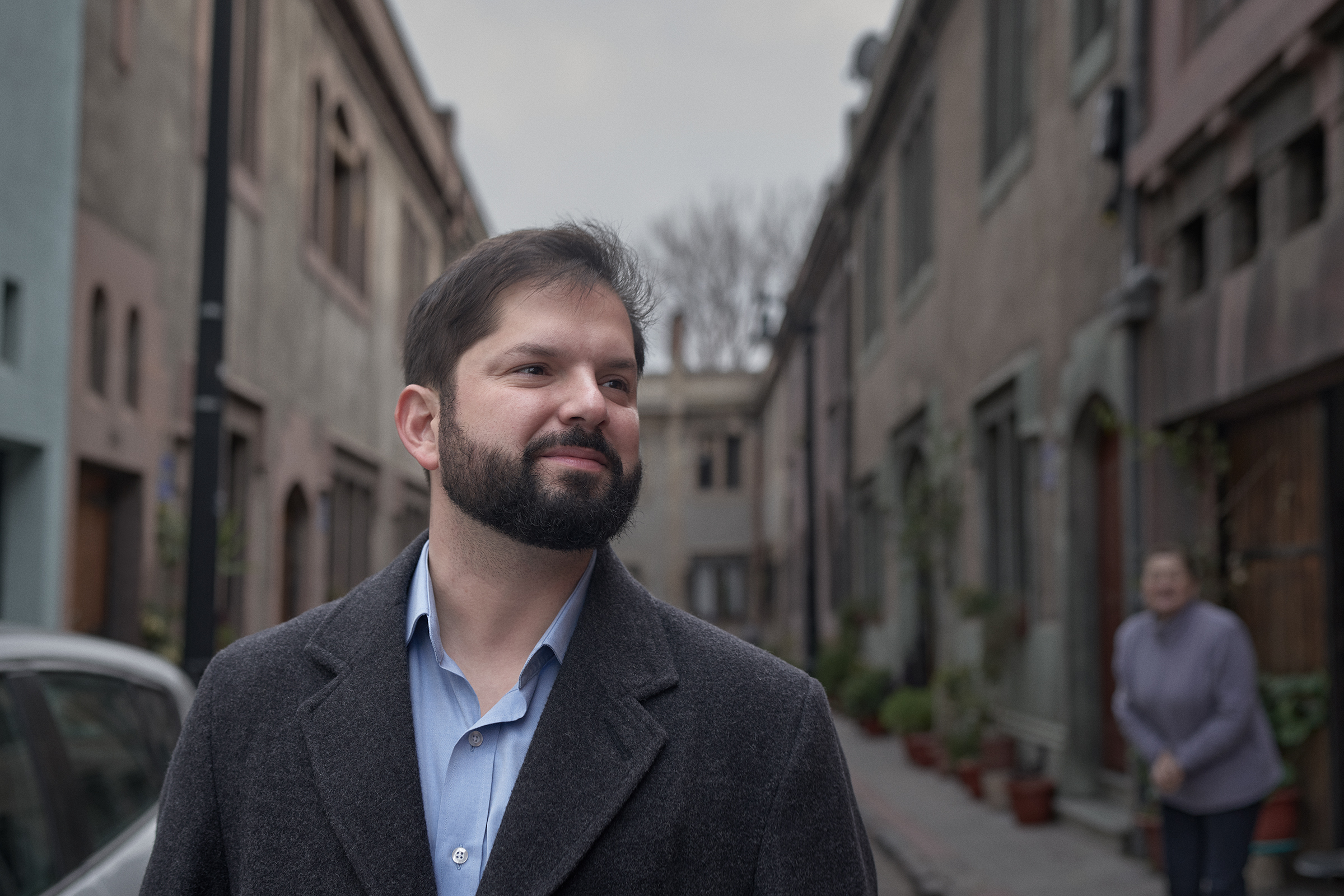Gabriel Boric climbs into the back of the gigantic black SUV waiting outside his house. It’s a cold morning in mid-August—winter in Santiago—and the Chilean President is enveloped in a slightly-too-long gray coat, making him look even younger than his 36 years. As the car rolls through city streets, windows down, pedestrians spot him on his way to work and let out whoops or an affectionate “Presi!” Boric laughs and waves, but then bows his head to nervously scan the front pages of Chile’s newspapers.
There’s plenty to be nervous about. Since taking office in March, Chile’s youngest-ever leader has been shepherding his country through a moment of historic uncertainty. For decades, Chile was touted as Latin America’s economic success story, with a business-friendly, small-government model creating relative wealth, and political stability, for its 19 million inhabitants. That narrative, however, concealed a long-simmering anger among many ordinary Chileans who, with little government support and expensive private services, struggle to make ends meet. In 2019, anger erupted: a small subway-fare hike set off massive, messy, months-long protests over inequality. Then politicians agreed to replace Chile’s constitution, a dictatorship-era document that underpins its market-driven economic system.
Read More: Read the Transcript of TIME’s Interview With Chile’s President Gabriel Boric
Boric, Chile’s most left-wing leader in half a century, owes his presidency to that upheaval. He was elected in December 2021, promising to lead Chile’s transition into the fairer country demanded by protesters. Five months into his term, it’s crunch time: in a Sept. 4 referendum, Chileans will vote on whether to approve a new constitution that offers sweeping progressive reforms, from a new health system to tighter controls on the mining industry. Supporters, including Boric, say it would make Chile a more democratic country and guarantee equality for marginalized groups; opponents say it would destroy the economy.
And so the millennial President finds himself guiding his country through a kind of midlife crisis. “It’s a lot of responsibility, for sure,” Boric says after arriving at his bright, cluttered office in La Moneda, Chile’s presidential palace. “But I wake up every morning excited to keep working on this.”
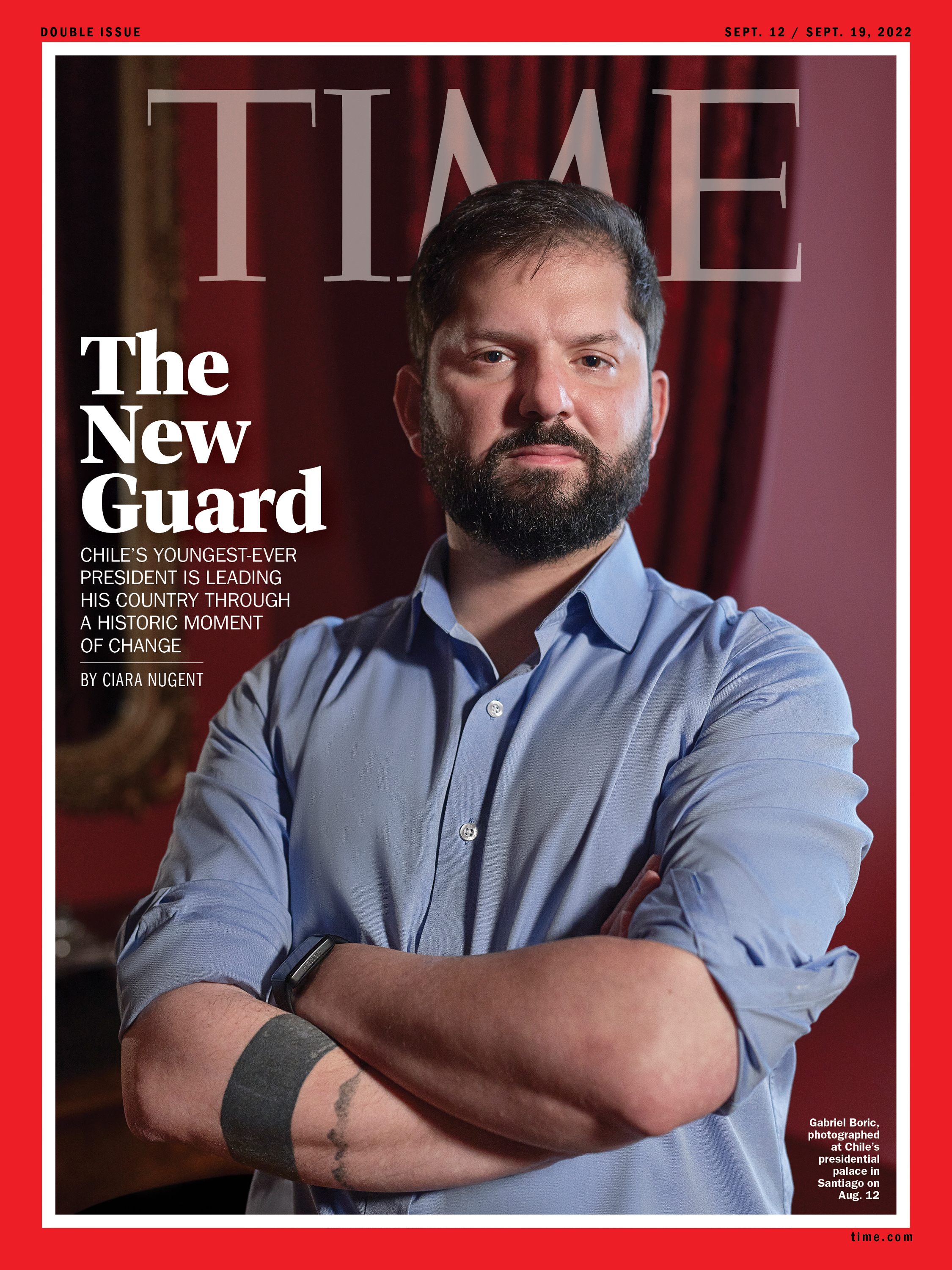
Boric’s rise is part of a regional shift to the left. After a decade of right-wing domination, leftists have recently won power in five of Latin America’s six largest economies, many on platforms to fight inequality. The largest, Brazil, may join them after October elections.
But Boric is also something new. An older generation of Latin American leftists, including many still active today, have often made troubling sacrifices—disregarding the environment, democracy, or human rights—in pursuit of a socialist society. Boric says those issues are a core part of his progressive ideology. And although he became famous in Chile in his 20s as a shaggy-haired, radical student leader, today’s Boric is no firebrand—even if some may want him to be. “I think that as a society we should aspire to forms of organization that go beyond capitalism, but it’s not like I can say, ‘Capitalism ends today,’” Boric says, rapping the table with his knuckles, in a brief imitation of more militant figures.
In person, Boric is warm and quick to laugh, but he’s not relaxed. There’s an intensity buzzing beneath the surface. Over the course of several hours with TIME in La Moneda, he sometimes carries a pen and paper to take notes, listening with a furrowed brow. When he hears criticism, he scrunches up his face as if chewing on a hard math problem. Sometimes he agrees. “You have to keep doubting yourself, and listening to others, or you’ll forget why you’re here,” he says, in a rapid tumble of Chilean Spanish. “Sometimes that means going a little more slowly. I always say: we’re going slowly because we’re going far.”
How far depends on the Sept. 4 vote. Mang Chileans have a growing sense that Boric is letting their country go off the rails: inflation is at a 28-year high, the peso’s value at an all-time low, and violent crime is surging. Boric’s approval rating stands at 38%, and polls now suggest that a majority of voters plan to reject the new constitution—a major blow to his agenda. Whatever happens, the world is watching the young President. “If Boric succeeds, I think it will have tremendous influence beyond Chile’s borders,” says Brian Winter, editor in chief of Americas Quarterly. “It will show that a new kind of leftist leader is possible.”
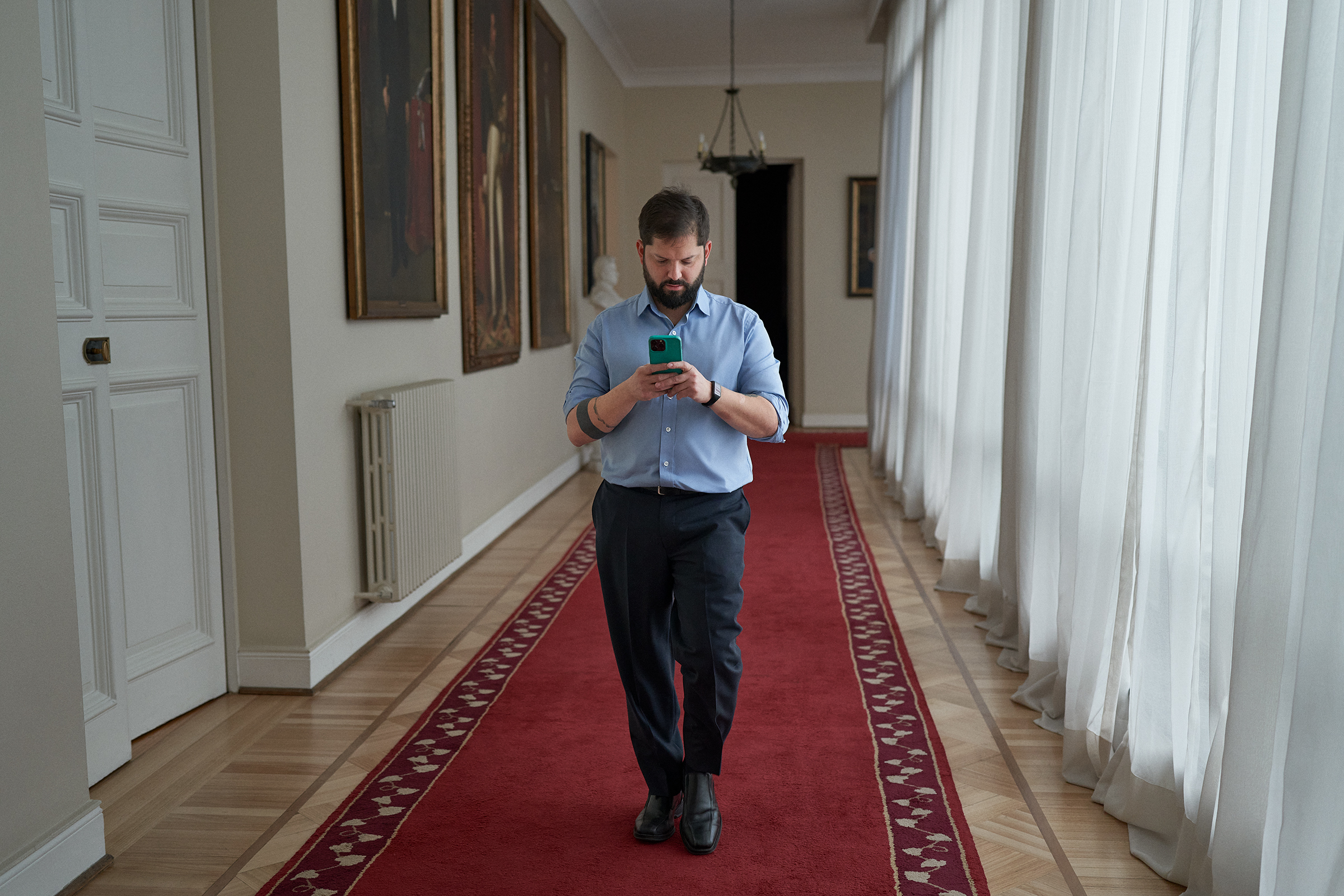
Boric grew up in Punta Arenas, a city of roughly 116,000 in remote southern Patagonia, where the wind blows so fiercely that streets have railings to stop people falling. The eldest of three boys, Boric was more bookish than his brothers, spending hours as a child reading novels brought home from work trips by his father, a Chilean engineer of Croatian descent—hence the pronunciation Bor-itch. Adventure stories were his favorite: tales of charming pirates, and children battling monsters.
But when he was 12 he came across a fantastical story that didn’t make sense to him. It was 1998, and Augusto Pinochet, the dictator who ruled Chile for 17 years, had just been arrested in London. Boric saw a group of women protesting on the news: they said Pinochet had made their relatives disappear. How could he make someone disappear, Boric wondered, if he wasn’t a magician?
Read more: Chile Is Trying To Shed the Last Remnants of Its Pinochet-Era Dictatorship
He traded novels for history books to find the answer: in 1973, Chile’s military, led by Pinochet, had violently overthrown the country’s democratically elected Marxist President, Salvador Allende, installing a right-wing regime in his place. Pinochet was aided by the Nixon Administration, which was set on halting the spread of left-wing ideology during the Cold War. By the time Chile’s dictatorship ended in 1990, it had tortured and imprisoned nearly 30,000 opponents and executed 2,279. A further 1,162 victims would never be found.
Learning about Pinochet sparked Boric’s political interest in his teens. He discovered other ways in which Chile’s past still shaped its present. Pinochet, with the help of a group of right-wing U.S. economists, had turned his country into a laboratory for neoliberalism—a school of thought that sees free market capitalism as the only route to economic success. (Decades later, during his election campaign, Boric would pledge that “if Chile was the cradle of neoliberalism, it’ll also be its grave.”) Pinochet shrank the role of the Chilean state, favoring private enterprise in the provision of education, health care, pensions, and even water.
Chile’s system has since lifted millions out of poverty. From 2000 to 2017, the share of Chileans living on less than $5.50 a day fell from 30% to 6.4%, per the World Bank. “That was important. But at the same time we were building a really unequal society,” Boric says. The cost of living has surged, and services exist in a two-tier system, where only those with money can access quality. For instance, 6 in 10 Chilean students pay to attend high school; Boric and his brothers were among them. “When I knew the history, I understood that the privileges that you have in a society as unequal as Chile are sustained by the fact that others don’t have them. It made me really angry.”
He expressed his anger as many teenagers do: he wore grungy pants and a lumberjack shirt, and grew out “the little facial hair I could,” he says. He got into punk and rock music: Pearl Jam, Metallica, Tool, Chile’s Los Prisioneros, and Argentina’s Charly García. (He still listens to music “almost constantly” and says rock dominates his playlists, despite the reputation he gained as a “Swiftie” when he tweeted support for Taylor Swift, after meeting her Chilean fan base: “They adopted me. I like Red, Folklore, ‘Cardigan.’ But it’s not the style of music I’m most into.”) Over meals, Boric would debate politics with his centrist father, and share “mediocre” poems he had written.
Boric also found ways to act on his feelings. In 2000, at 14, he helped relaunch Punta Arenas’ high school student union, at a time when Chile was experiencing a revitalization of the student movement. A once potent political force, it had been repressed by Pinochet before petering out in the 1990s in a period of relative political apathy. Boric’s generation brought it roaring back. At 20, while studying law at the University of Chile in Santiago, he joined months of marches and building occupations by school and college students, demanding a fairer education system.
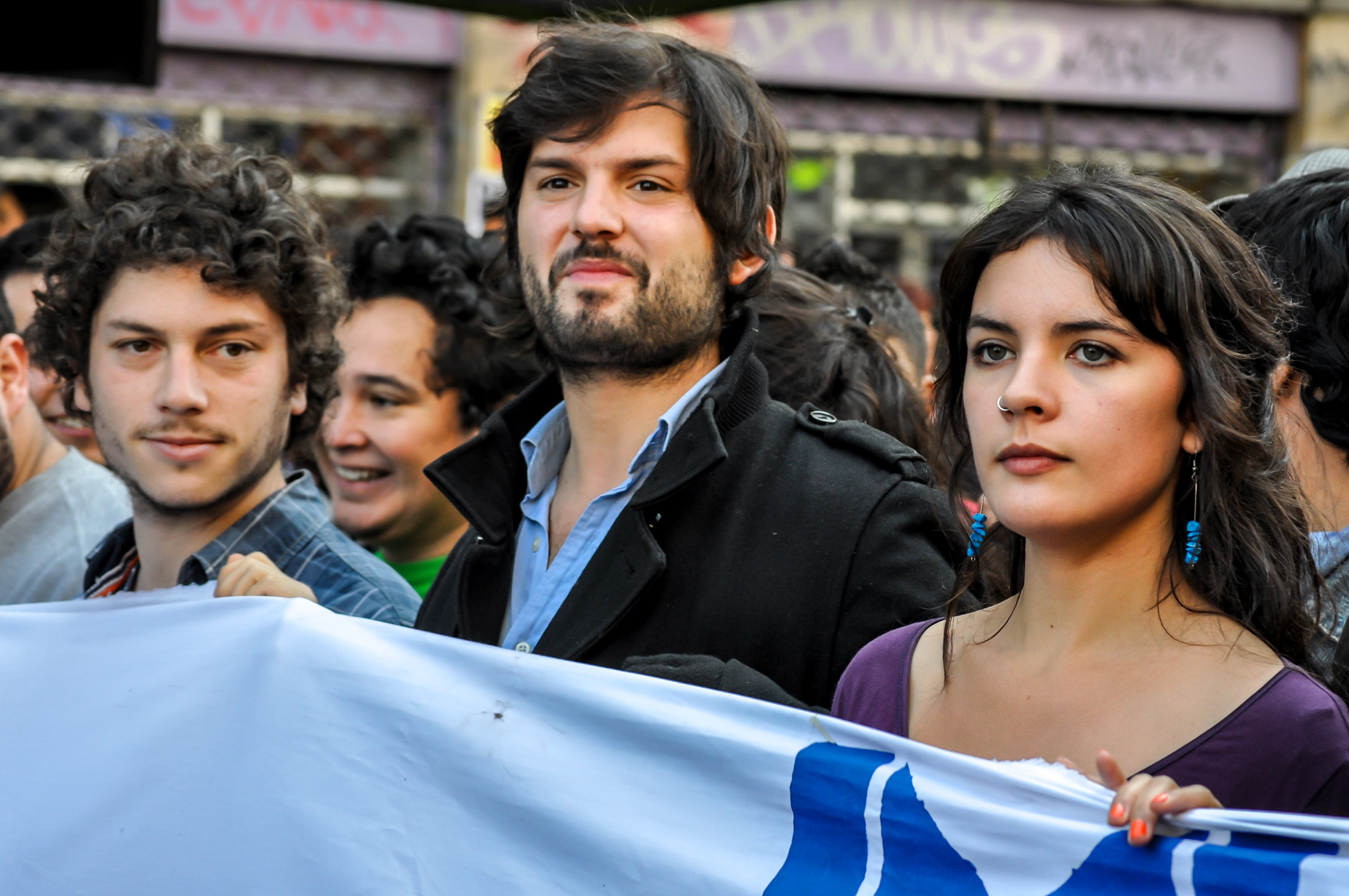
Boric became well known in 2011, when he was 25. That year, during another mass mobilization of hundreds of thousands of students, he was elected leader of Chile’s national federation of student unions. After his victory, an excited Boric told reporters that young people were tired of “the government and the political class, who want to commercialize all aspects of our lives.” A movement was coming, he said, “which would transform not only education, but the entire country.”
That movement had a few victories over the next few years. In 2013, four prominent figures from the student movement, including Boric, won seats in Congress, which was then made up of 158 legislators. But change was frustratingly slow, even under center-left President Michelle Bachelet (2014 to 2018). That’s partly because of Chile’s rigid constitution, written under Pinochet in 1980. Though it doesn’t explicitly endorse neoliberalism, it acts as a kind of ideological straitjacket by making many legislative changes dependent on approval by a constitutional court and a large majority in Congress. Those are hard to come by, thanks to an electoral system designed to produce stalemates. In 1979, the constitution’s writer said he aimed to “restrain whoever is governing” so that “if our adversaries get into power, they’ll be forced to take actions not so different to the ones we’d want.”
For a long time it seemed nothing could blast through that stagnation. Then, from October to December of 2019, roughly 3 million Chileans—some 16% of the population—took to the streets, led by students and other young people. The protests were sometimes violent; city centers were smashed up and set alight, and police responded brutally. Around 30 people died and hundreds were imprisoned by the government of right-wing President Sebastián Piñera. The period is now known as the social explosion.
Read More: I Was Shot and Lost My Sight for Protesting Inequality in Chile. We Need to Keep Demanding Justice
Boric, then in his second term as a Congressman, joined some of the protests, sharing many of the organizers’ concerns. But he was no longer the activist of his 20s. “We couldn’t just be agitators,” he says. “We had to offer an alternative, something to channel the conflict in some direction.”
That thinking led Boric, in November 2019, to champion an agreement with Piñera and other politicians to hold a referendum on whether or not to launch a project to replace the Pinochet-era constitution. It was controversial: left-wing politicians largely rejected the deal, fearing a constitutional process led by Piñera, a 72-year-old billionaire, would be designed to prevent real change, and represent a betrayal of the imprisoned protesters. In December 2019, a group of young protesters attacked Boric, emptying beer cans over his head while he sat on a park bench in Santiago. “You sold us out,” they shouted. In a video of the incident, Boric remains still. “I was reflecting in that moment,” he recalls. “They were accusing me of something that I didn’t believe I had done. And I still don’t. But it was hard, and it wasn’t the only time.”
For many, though, Boric’s willingness to work with political rivals legitimized him as a viable leader. Chile held that first referendum in October 2020, with 78% of voters opting to replace the constitution. Then the time came to replace Piñera as well, at scheduled 2021 presidential elections. In a surprise result in July 2021, a left-wing electoral coalition chose Boric as its candidate, over a Communist Party politician who had opposed the deal. In December, at the second round of the presidential election, Boric won 56% of the vote—a lead of 12 percentage points over José Antonio Kast, a far-right lawmaker with ties to the Pinochet regime.
Stephania Escobar, a handicraft seller at a central Santiago market in her 50s, was among those who voted for Boric. “It’s a big collective task we have on our hands. But he’s like a bridge,” she says, “a bridge to the changes we want to make.”
When asked to describe their new President, many Chileans speaking to TIME use the word cercano (close) because Boric’s political style is less formal than most. He talks openly, for example, about his struggles with obsessive-compulsive disorder, which led him to check into a psychiatric clinic in 2018, and which still manifests in small gestures he makes at public events. He speaks candidly with TIME about gaining weight during his campaign, prompting him to start boxing in the mornings before work.
Read More: Chile’s Protest Reflect Our Unequal Times
Boric also lives physically closer to ordinary Chileans. The country has no official presidential residence, and previous leaders, largely elected in their 60s and 70s, have favored posh neighborhoods to the north of Santiago. After his election, Boric and his partner Irina Karamanos—a 32-year-old feminist activist he began dating in 2019—moved into a modest house in Yungay, a central neighborhood. Their neighbors are families and students living in subdivided, run-down buildings, and crime rates are high. The President’s team grumbles that he insists on walking to buy bread nearby, causing a minor security headache. Boric has also tried to make his office more approachable. He reopened a public square outside La Moneda that was previously cordoned off, and speaks with crowds gathered there most days.
Some of it feels contrived. Tomás Boric, 29, the President’s youngest brother, says the down-to-earth image reflects what he saw growing up, though. “Most people spoke to me like a kid, but Gabriel never did,” he says. “He listened to me. He gave me his time. He does that for everyone.”

Boric now finds himself at the helm of a bold social experiment. For decades, Latin America’s vast gap between rich and poor—one of the largest in the world—has stunted economies and fostered disruption: rapid swings from right to left, guerrilla wars, strongmen, coups, and corruption. In Chile, the left hopes that rewriting the constitution could address inequality in a uniquely democratic way—and perhaps serve as an example for other nations. “I feel so lucky to have been born at this time,” says Ericka Ñanco. Elected to Congress in November at age 29 to represent the southern Araucanía region, she is one of the youngest members of Boric’s coalition. “In other eras, the dreams of young people were crushed. Now we have the opportunity to change things.”
The new constitution was drafted by an assembly of 155 representatives, chosen at a special election in May 2021: 77 are women, and 17 are from Chile’s Indigenous communities, proportional to their 13% share of the population. Proponents of the new constitution say it imagines a better country, one that balances economic development with workers’ rights, environmental protections, and gender equality. It particularly emphasizes the rights of marginalized groups, including the autonomy of the Indigenous peoples, who were not even recognized in Pinochet’s constitution, over their own cultures, land, and institutions. The document calls for drastic changes to Chile’s political structures, as well as new national health care and education systems (private operators would remain, but with more oversight). In August, an international group of progressive economists said the draft “prepares Chile for a new century of equitable growth.”
That outcome is far from assured. Winter of Americas Quarterly says “the hope is that Chile is able to achieve developed world status in the next 10 or 20 years,” if it can reduce inequality, a major barrier to development. “I think that’s very much on the table. But the fear is that Chile will lose what made it an imperfect success story over the last 30 years.” That is, it could trade its stable market-driven economy for the stagnant, inflation-prone chaos of its neighbor Argentina, hurting poor as well as rich Chileans.
For Kenneth Bunker, a Chilean pollster, the new constitution has too many flaws to accept. He sees it as a mishmash of the 155 assembly members’ diverse priorities. “It over-regulates so much that there will be a lot of fights about enacting it.” There are also major specific concerns: a plan to abolish the Senate, for example, would leave many pieces of legislation subject to only one chamber’s approval, undermining Chile’s consensus-based political culture. Conservatives are also worried about the breadth of proposed spending: the Economist dubbed the document “a fiscally irresponsible left-wing wish list.”
Many argue the document does not accurately reflect the wishes of the general population because turnout for the elections for the constitutional assembly was only 43%. More than half of the representatives chosen came from left or center-left blocs. Many others were progressive-leaning independents, while less than a third came from the right, according to Chilean media.
Boric accepts that some parts of the text need more clarity before they become the law of the land. “There are always things that could be improved, and we’re having that debate,” he says. “But it’s a big step forward for Chile.” He is urging voters to approve it, promising Congress will reform the document after it passes.
It’s unclear if that will happen. Alongside legitimate criticism, opponents of the new constitution have mounted a misinformation campaign on social media and in paper leaflets. Among the false claims circulating are that the draft would abolish Chile’s police force, ban the sale of bottled water, allow abortion at any stage of pregnancy, and outlaw private property. Given the actual text runs to 170 pages of academic language, many voters are relying on others to interpret it for them. The most ardent opponents claim that adopting it would be Chile’s first step toward becoming the new Venezuela—whose socialist economy has imploded over the past decade—and that Boric is enthusiastically leading them down that path.
It is true that Chile’s Communist Party makes up a fifth of Boric’s coalition in the lower house of Congress. But the President himself belongs to the more center-left Social Convergence Party, and his aspirations lie closer to European-style social democracy. “I don’t see a state controlling everything like in the socialisms of the 20th century, which failed,” he says. “We have to take ownership of that failure.”
Deeply marked by the memory of the Pinochet regime, Boric is outspoken about violations of democracy and human rights—whether they come from the right or left. He has criticized far-left leaders in Cuba, Venezuela, and Nicaragua who have embraced authoritarianism—a break from older leftists in the region, who tend to keep quiet about abuses on their own side. That attitude frustrates Boric, he says with a sigh. “I can’t get outraged when rights are violated in Palestine but not in Nicaragua, because when the defense of human rights is partial, it loses legitimacy. In Chile, we’re going to do things differently.”
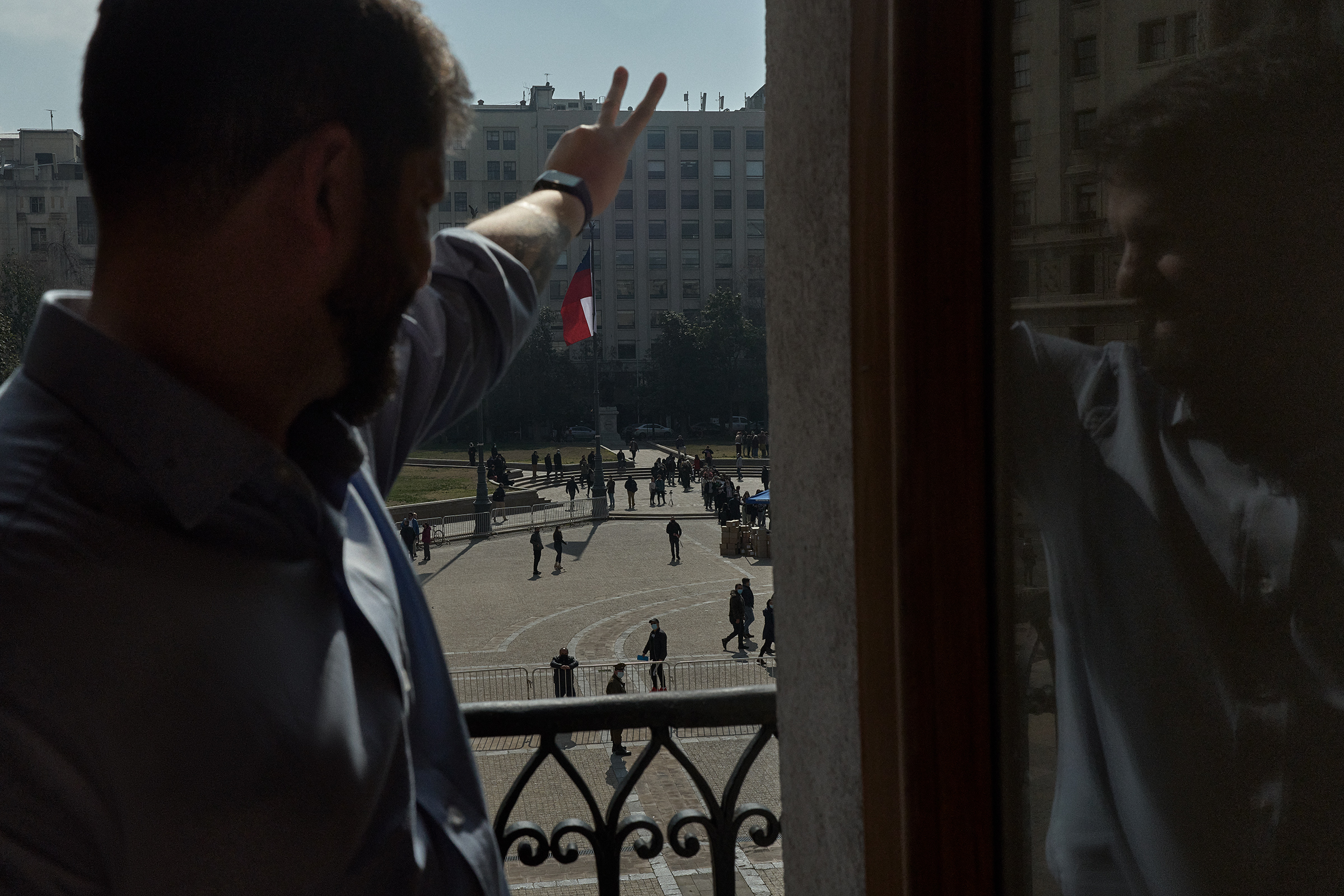
Walking around the extravagantly upholstered furniture and high-ceilinged corridors of La Moneda, a museum-like colonial building where Presidents have worked since the 1800s, Boric can look a little out of place. He could be a hipster barista, with his trendy beard and tattoos peeking out of his shirt, or maybe a young professor— a studious type who reels off suggested reading lists on request.
Many Chileans seem happy to have a young President. But others say Boric and his team, which includes several former student activists, are inexperienced. Some episodes feel like minor misfires: in rethinking the role of First Lady, Boric’s girlfriend briefly renamed her office “Irina Karamanos’ Cabinet,” leading to claims that she was personalizing the institution. Some feel ridiculous: right-wing media attacked Boric for leaving his fly down at an official meeting. (“Now I’m always worried when I’m getting out of the car,” he says.)
But Boric has also made some serious U-turns. In April, bowing to pressure from his left, he proposed allowing Chileans to withdraw money from their pension pots, despite having expressed fears that such moves worsen inflation. (The plan was rejected by Congress.) “He seems to draw a line in the sand. And then something happens and he has to follow others back over it,” says Bunker.
The most serious stumble so far has been on security. As a Congressman, Boric condemned Piñera’s decision to deploy the military to Araucanía, where small separatist groups from the Indigenous Mapuche community are engaged in a violent conflict with forestry companies. Security forces have killed several Mapuche people in high-profile cases. But in April, Boric remilitarized the region’s roads. The apparent about-face left the impression that Boric’s team doesn’t know what it’s doing, according to Salvador Millaleo, a Mapuche lawyer. “They did not prepare enough,” he says. “They underestimated both the importance and complexity of this issue.”
Boric says his government “may have been a bit headstrong” in its initial approach to the conflict. “I am still convinced that the state of emergency is not the solution,” he says. But, he adds, “I am the President of all Chileans. So sometimes I have to do things I don’t like.” He pauses and, speaking slowly, disagrees that his U-turns indicate a failure of leadership. “Changing your position isn’t a weakness, as long as it’s coherent with your principles. I’m more concerned about people who can never change their mind.”
Boric is hoping Chileans have not changed their minds about rewriting the constitution, though. If voters approve the new draft on Sept. 4, the national transformation Boric wants will begin in earnest: Congress will embark on a years-long project to draft new legislation. If they reject it, as polls suggest they will, Boric says the huge mandate from the October 2020 referendum will still apply: Chile would start again from scratch, holding elections for a fresh constitutional assembly to write a new draft. If that happens, parts of his agenda may be left in limbo.
But Boric says there’s still a lot he can do in the meantime. His government has pushed through a 17% minimum wage hike, and recently announced a bill to cut the workweek from 45 to 40 hours. In July, they unveiled a major tax reform to raise levies on high earners, capital gains, and mining companies. And after Congress approved a climate law in March, Boric’s Environment Minister, a climate scientist, has begun drawing up Chile’s plan to reach net-zero emissions by 2050.
Read more: An Indigenous Rights Leader Is Trying to Rewrite Chile’s Constitution to Put its Ecosystems First
Boric also has wide discretion over foreign policy. He says he wants to refocus regional relationships away from 20th century ideological alliances, toward cooperation on climate action. A key aim is to band Latin America together “under one voice” to pressure richer countries to cut their emissions faster. That could include “making the exports of raw materials or clean energy conditional on changes in consumption behavior in more developed countries,” he says. (Chile holds major reserves of copper and lithium, essential for renewable technologies like electric cars.) He wants to attend October’s U.N. climate conference in Egypt to begin those discussions, he says. “Everyone has a responsibility, but some are more responsible than others. And we have to demand they meet theirs.”
When Boric was preparing for his presidential portrait in the run-up to his inauguration in March, he and his team looked at those of all his predecessors. Each one seems to fit their era: 19th century colonial liberators in their military uniforms; early 20th century land barons in refined bow ties. Then Allende in 1970, slouching in a chair: unaware of what would happen to his government three years later. Next, Pinochet, another military man, severe and confident of his hold over Chile. Finally, the slick-suited statesmen—and woman—of the neoliberal era.
Boric was sure of one thing: he wouldn’t wear a tie. He had long eschewed them, causing a minor sensation in the Chilean press. The dress code for leaders has changed over the centuries, he says, from “French kings in high heels and stockings” to “Barack Obama sitting on top of his desk.” He’s pretty confident that in 20 years, more Presidents will have nixed the tie. “I’m part of a transition here.”
He ended up with a photo in which he looks a little stiff, standing in front of the Pacific Ocean. It’s impossible to know what teleological meanings people will draw from it in a few decades. Is this the President defeated by a referendum a few months into his term? The one who blew up Chile’s economy and lost control of its security? Or the one who transformed his country and created a new model for Latin America’s left? On this, Boric is less willing to make predictions. “You can’t worry about how history will unfold,” he says. “If you do, you’ll get dizzy.”
— With reporting by Solcyre Burga and Anisha Kohli/New York
More Must-Reads from TIME
- Cybersecurity Experts Are Sounding the Alarm on DOGE
- Meet the 2025 Women of the Year
- The Harsh Truth About Disability Inclusion
- Why Do More Young Adults Have Cancer?
- Colman Domingo Leads With Radical Love
- How to Get Better at Doing Things Alone
- Michelle Zauner Stares Down the Darkness
Write to Ciara Nugent/Santiago at ciara.nugent@time.com
